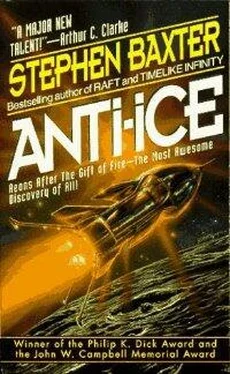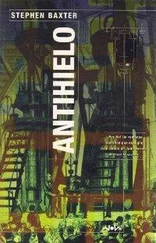Stephen Baxter - Anti-Ice
Здесь есть возможность читать онлайн «Stephen Baxter - Anti-Ice» весь текст электронной книги совершенно бесплатно (целиком полную версию без сокращений). В некоторых случаях можно слушать аудио, скачать через торрент в формате fb2 и присутствует краткое содержание. Год выпуска: 1993, ISBN: 1993, Издательство: Collins, Жанр: Фантастика и фэнтези, на английском языке. Описание произведения, (предисловие) а так же отзывы посетителей доступны на портале библиотеки ЛибКат.
- Название:Anti-Ice
- Автор:
- Издательство:Collins
- Жанр:
- Год:1993
- ISBN:978-0-246-13835-4
- Рейтинг книги:5 / 5. Голосов: 1
-
Избранное:Добавить в избранное
- Отзывы:
-
Ваша оценка:
- 100
- 1
- 2
- 3
- 4
- 5
Anti-Ice: краткое содержание, описание и аннотация
Предлагаем к чтению аннотацию, описание, краткое содержание или предисловие (зависит от того, что написал сам автор книги «Anti-Ice»). Если вы не нашли необходимую информацию о книге — напишите в комментариях, мы постараемся отыскать её.
Anti-Ice — читать онлайн бесплатно полную книгу (весь текст) целиком
Ниже представлен текст книги, разбитый по страницам. Система сохранения места последней прочитанной страницы, позволяет с удобством читать онлайн бесплатно книгу «Anti-Ice», без необходимости каждый раз заново искать на чём Вы остановились. Поставьте закладку, и сможете в любой момент перейти на страницу, на которой закончили чтение.
Интервал:
Закладка:
“And,” I said, “think of the impact which must have caused such a monstrous scar. It must have come close to splitting the damn Moon in two.”
He stroked his chin and inspected the huge crater with an appraising eye. “And yet it is scarcely possible to envisage a meteorite impact of such a magnitude… No, Ned; I suspect the explanation for that vast feature is still more exotic.”
“What do you mean?”
“Anti-ice! Ned, if that remarkable compound has been discovered on the surface of the Earth, what is to stop it being available on other planets and satellites?
“I envisage a comet-like body falling in to the Solar System, perhaps from the stars, largely or wholly composed of anti-ice. As the Sun’s heat touches it I imagine little pockets of the ice exploding, and the wretched body being twisted and spun this way and that.
“At last, though, blazing and glowing, it falls close to the Earth—only to find the inert form of Earth’s patient companion in its way.
“The detonation is astounding—as you say, almost enough to split the Moon in two. Crater walls roll across the tortured surface like waves across a sea. And one must imagine millions of tons of pulverized lunar rock and dust being hurled into space—with fragments of the original anti-ice comet embedded within it. And so, perhaps, some fragments reached even the surface of the Earth itself.”
I stared up at that desolate craterscape and shivered, imagining it superimposed on a map of Europe. “Then we must be grateful to the Moon that the comet never reached Earth, Sir Josiah.”
“Indeed.”
“And do you suppose the wretched Professor Hansen could have been right after all? Could there have been an air-covered area of the Moon—perhaps inhabited, but now laid waste by the anti-ice explosion?”
He shook his head, a little wistfully. “No, lad; I fear the good Dane was wrong all the way; for the geometry of the Moon itself does not support his egg-shape theory. Our chances of finding the water we need to save our lives remain negligible.”
In desperation I turned my face up to the darkling landscape over which we flew, inverted. So my diplomatic skills had succeeded in bringing Traveller out of his funk—but not to the extent that he might lift a finger to save our lives.
…And then I noticed once more, twinkling like a hundred Bethlehem stars, bright, glassy sparkles amid the tumbled lunar mountains. I cried out and pointed. “Traveller! Before you sink completely into despair, look above you. What do you see, shining in the last of the Sun’s rays?”
Again he rubbed his chin, but he looked closely. “It could be nothing, lad,” he said gently. “Outcroppings of quartz or feldspar—”
“But it could be water, frozen pools of it shining in the sunlight!”
He turned to me almost kindly, and I sensed he was about to launch into an extended lecture on the source of my latest misapprehension—and then, like the reappearance of the Sun from a cloudbank, his face lit up with determination. “By God, Ned, you could be right. Who knows? And it’s certain we will never find out if we let ourselves fall helplessly to that tumbled surface. Enough of this! We have a world to conquer.” And he grabbed his stovepipe hat out of the air and screwed it down over his cranium.
I was filled with elation. I said, “Will you resume the plan you have written in your little book?”
He looked down at the notebook still tied to his knee. “What, this? I have moped my way into too great a deviance from the schedule, I fear.” He tore the book from his knee and hurled it, spinning, into the shadows of the Bridge. “It is too late for calculation. Now we must pilot the Phaeton as she was meant to be piloted—with our hands, our minds, our eyes. Hold on, Ned!”
And he hauled back his levers; the anti-ice rockets roared, and I was hurled bodily to the deck.
The next several minutes were a nightmarish blur. Traveller kept the rockets shouting, and the deck of the Bridge—an uneven series of riveted plates—pressed into my face and chest. I could do nothing but cling to whatever purchase I could find—like the iron pillars which supported Traveller’s couch—and reflect that it was typical of Traveller to neglect utterly the well-being of those he was trying to save. Surely a delay of a few seconds to allow me to regain my seat in the Cabin would not have mattered one way or the other.
After some minutes the quality of the Moonlight seemed to change. The shadow of my head shifted and lengthened across the deck; and at last I was plunged into a darkness broken only by the dim glow of Traveller’s Ruhmkorff coils. I surmised that the ship had been turned around, so that our nose now pointed away from the Moon.
Then, blessed relief!—the motors reduced. Though the rockets continued to fire at a subdued level, it was as if a vast weight had been lifted from my shoulders. I cautiously pushed my face away from the floor, got to my hands and knees, and then to my feet—and surprised myself to find I was standing!
“Sir Josiah! We are no longer floating…”
He lay in his couch, lightly playing his control levers. “Oh, hullo, Ned; I’d quite forgotten you were there. No, we are no longer in free fall. I decided that boldness was the best course of action. So I launched us directly at the lunar surface, from which we were in any event a mere few thousand miles—”
“I was quite crushed against the plates.”
He looked at me in some surprise. “Were you? But the thrust was only a little more than a terrestrial gravity.” His look turned to sternness. “You have become weakened by the floating condition,” he said. “I warned you that you should maintain your exercise regime, as I have done; it is a wonder your bones, reduced to brittleness, did not crumble to dust.”
I framed a reply, which would have touched on the reasons for my abandonment of his routine—namely the several days I had spent as an invalid following my supposedly heroic jaunt into space—but I forbore. I said, “And then you turned the ship around.”
“Yes; now we are falling backside first toward the Moon,” he confirmed cheerfully. “The thrust you feel is about the gravitational acceleration we should experience on the surface of the Moon, which has been computed to be a sixth part of Earth’s. I have reduced our speed to an acceptably low level, and now I am firing the rockets in order to keep our speed constant.” He fixed me with a quizzical eye. “I presume you understand the dynamics of our situation?—that the equality of lunar gravity and the rocket thrust is no coincidence?”
“Perhaps we could go over the theory later,” I said drily. I raised myself to my toes and bounced up and down on the deck; in my enfeebled state even this fractional gravity felt significant, but I was able to jump easily into the air. “So this is how it would feel if one could walk around on the Moon?”
“Quite so.” Now he craned back his neck and peered into his periscope. “Now I must fix on our landing site. We will land amid lunar mountains, during a sunset.”
Clinging to the couch I turned to look through the windows. The sky above, away from the Sun, was utterly dark; and as we were descending toward the Moon’s hidden face Earth herself was concealed from us now. All around us gaunt fingers of rock, shattered in that ancient explosion, reached serrated edges toward us, and shadows pooled like spilt blood.
I asked, “Why not land in a daylit area? Those shadows must make a choice of a safe landing spot virtually impossible.”
With some impatience Traveller replied, “But the Phaeton has not been designed for extended jaunts on the lunar surface, Ned! Recall that while she is in space the craft must rotate continually to avoid one side or the other overheating in the Sun’s rays. Here, such rotation will not be possible—yet the solar rays will be just as intense as between worlds. I would hope that our stay here, if the Lord allows us to survive our landing, will not encompass more than a few hours; but even that length of time in the pitiless glare of the Sun would rapidly cause our fragile vessel to burn up. And in the lunar night we would freeze solid. No; our best hope is that I can place us with some fraction of our surface in shadow, and the rest in the sunlight, so that we attain some balance between fire and ice.”
Читать дальшеИнтервал:
Закладка:
Похожие книги на «Anti-Ice»
Представляем Вашему вниманию похожие книги на «Anti-Ice» списком для выбора. Мы отобрали схожую по названию и смыслу литературу в надежде предоставить читателям больше вариантов отыскать новые, интересные, ещё непрочитанные произведения.
Обсуждение, отзывы о книге «Anti-Ice» и просто собственные мнения читателей. Оставьте ваши комментарии, напишите, что Вы думаете о произведении, его смысле или главных героях. Укажите что конкретно понравилось, а что нет, и почему Вы так считаете.












